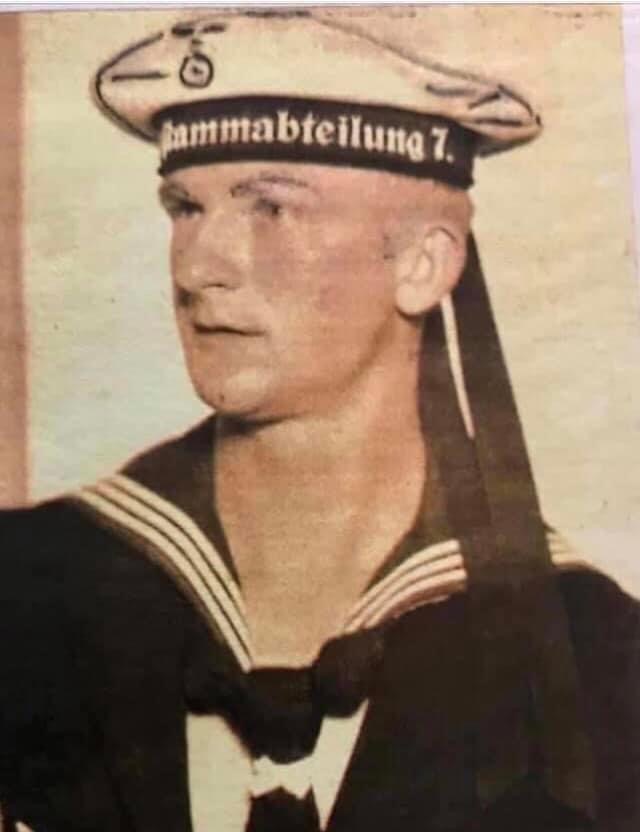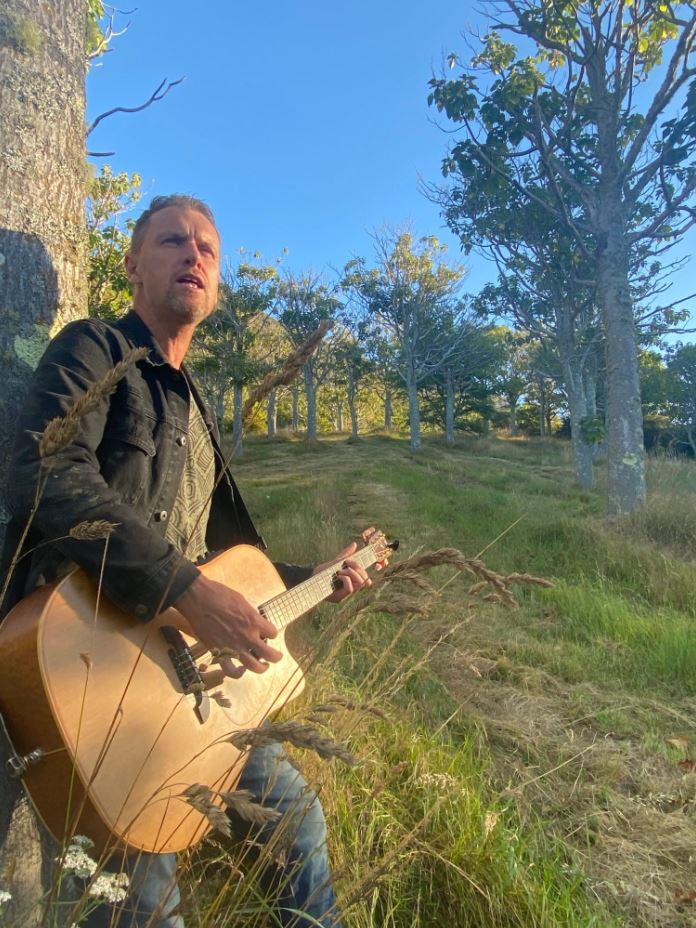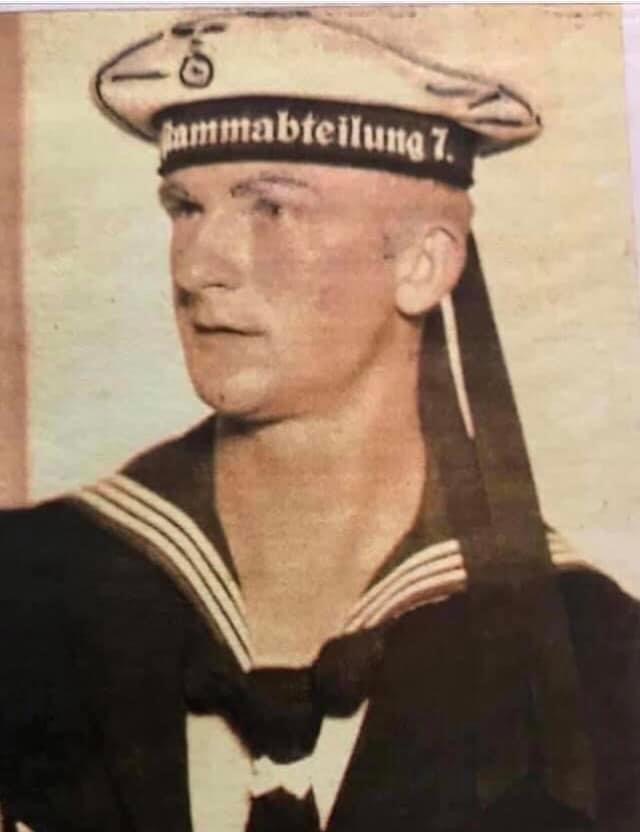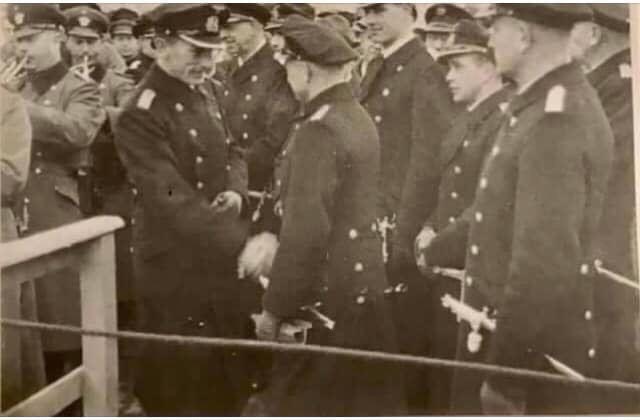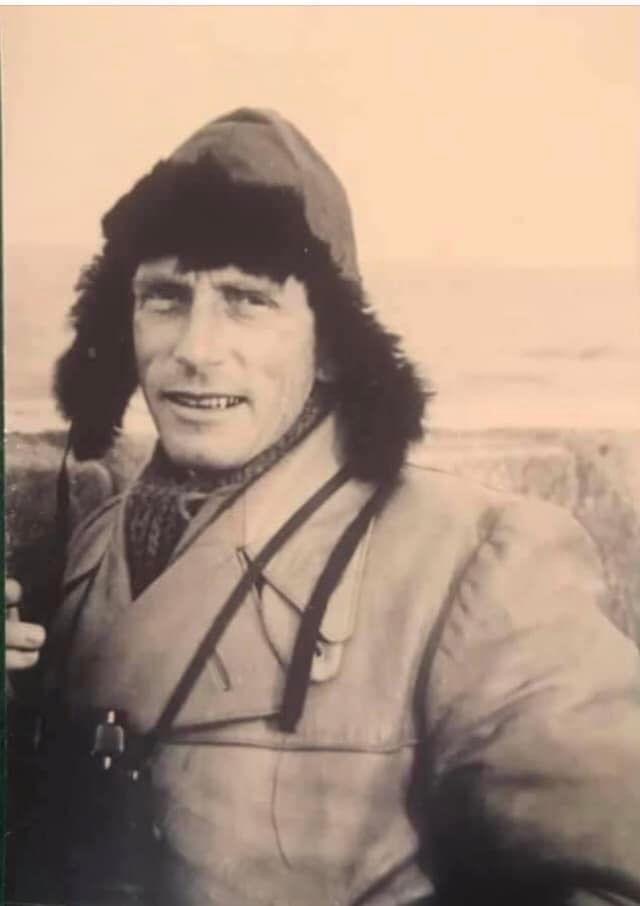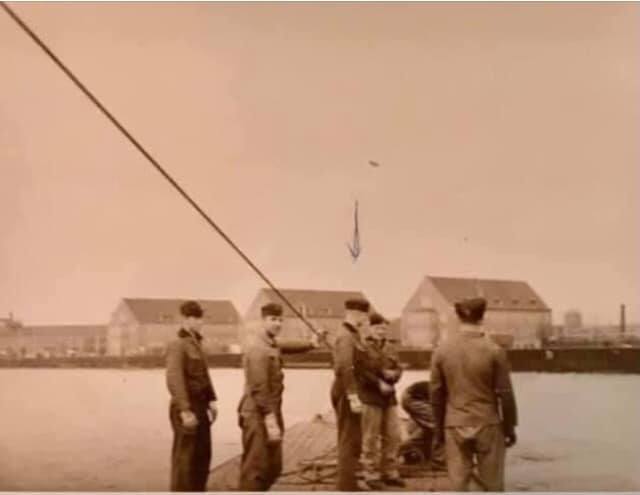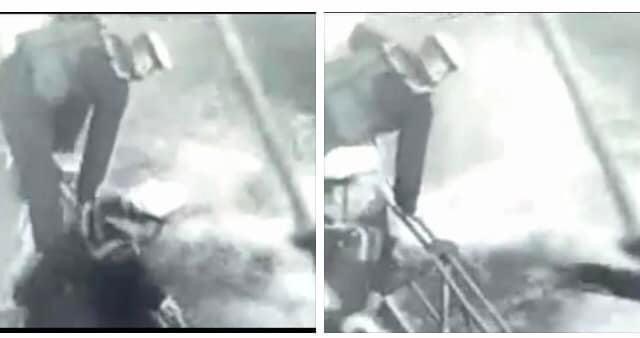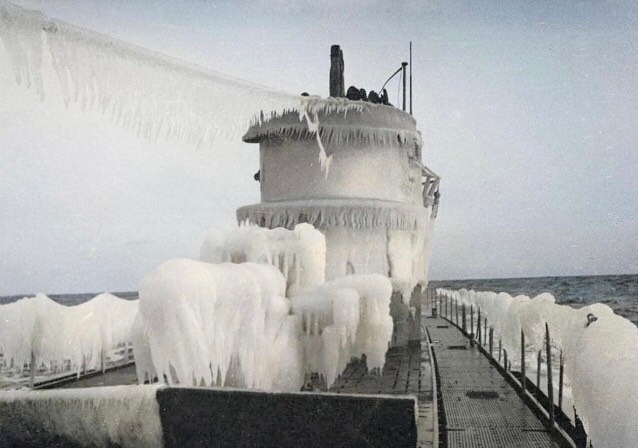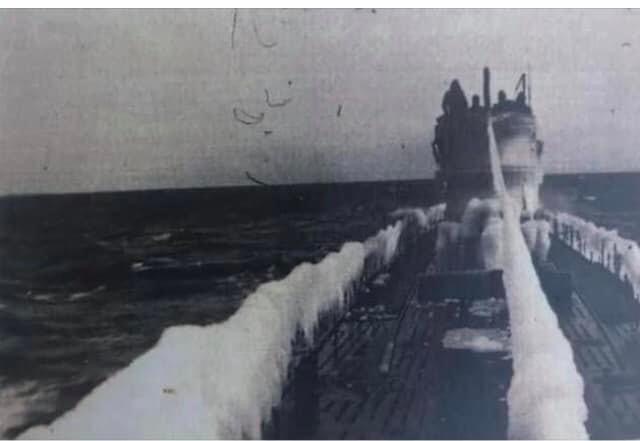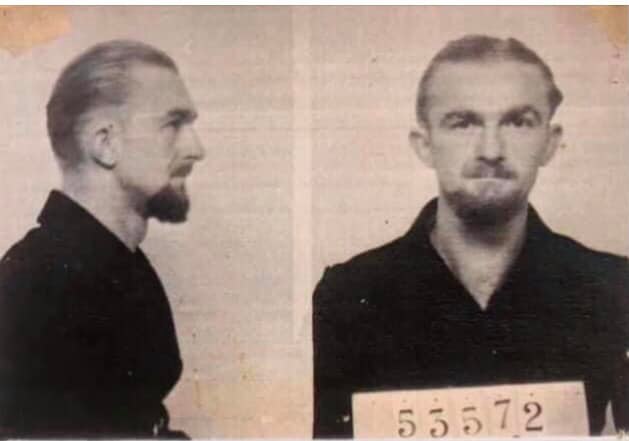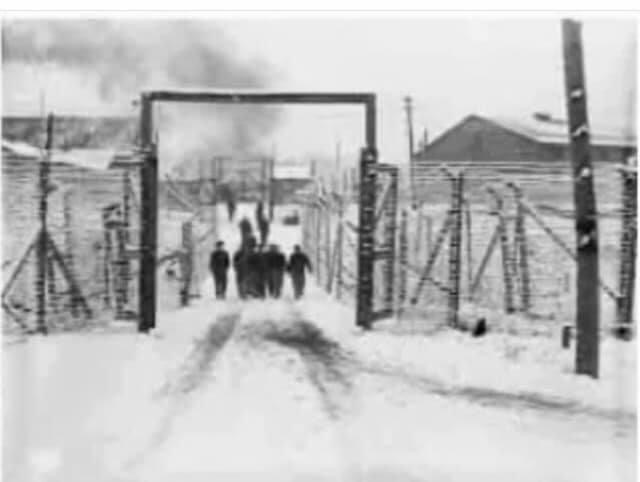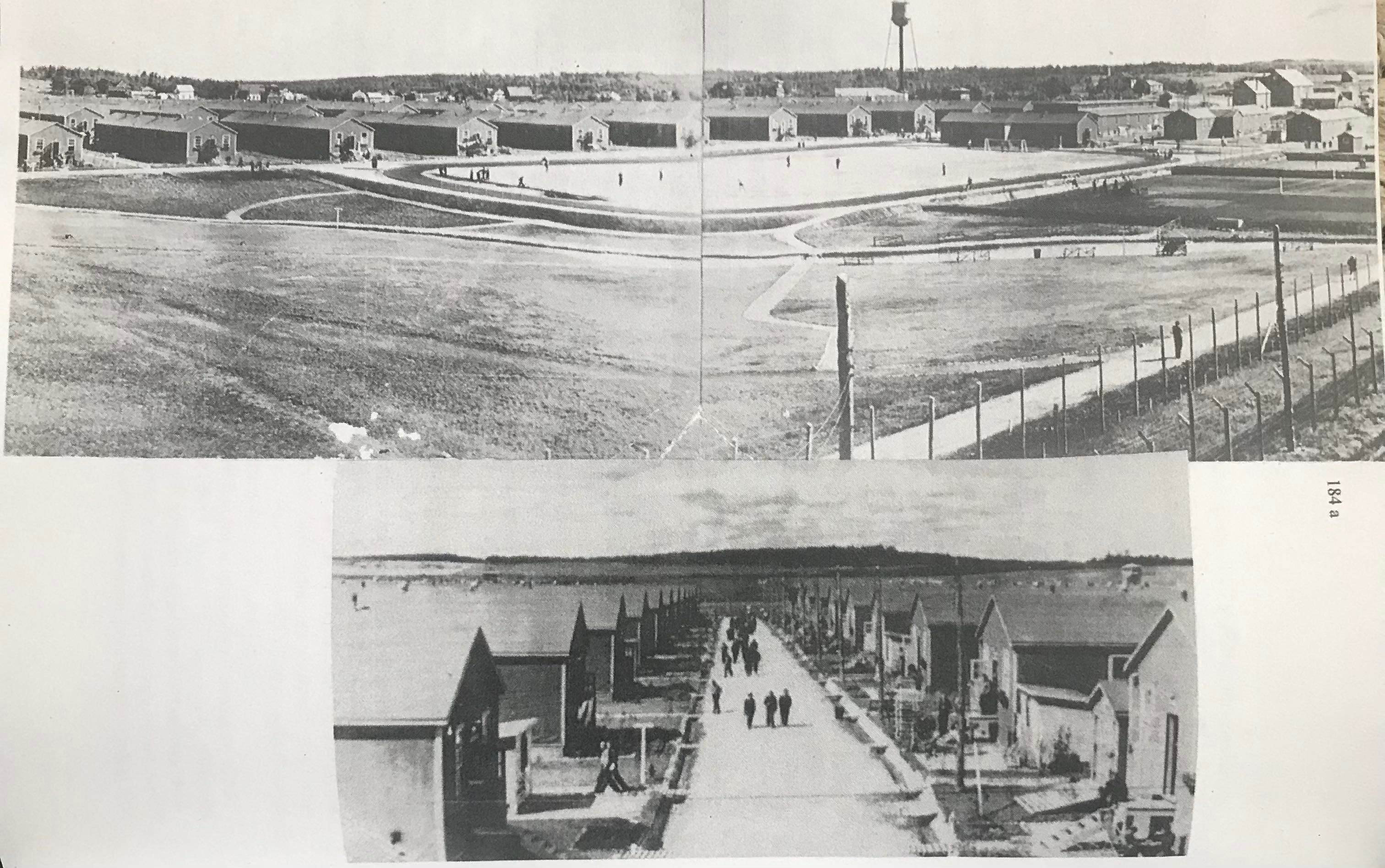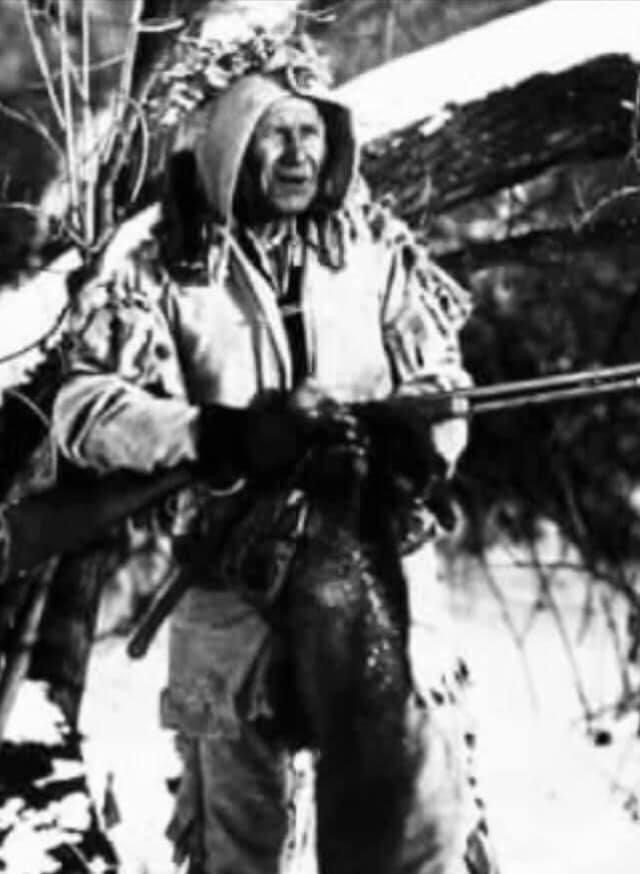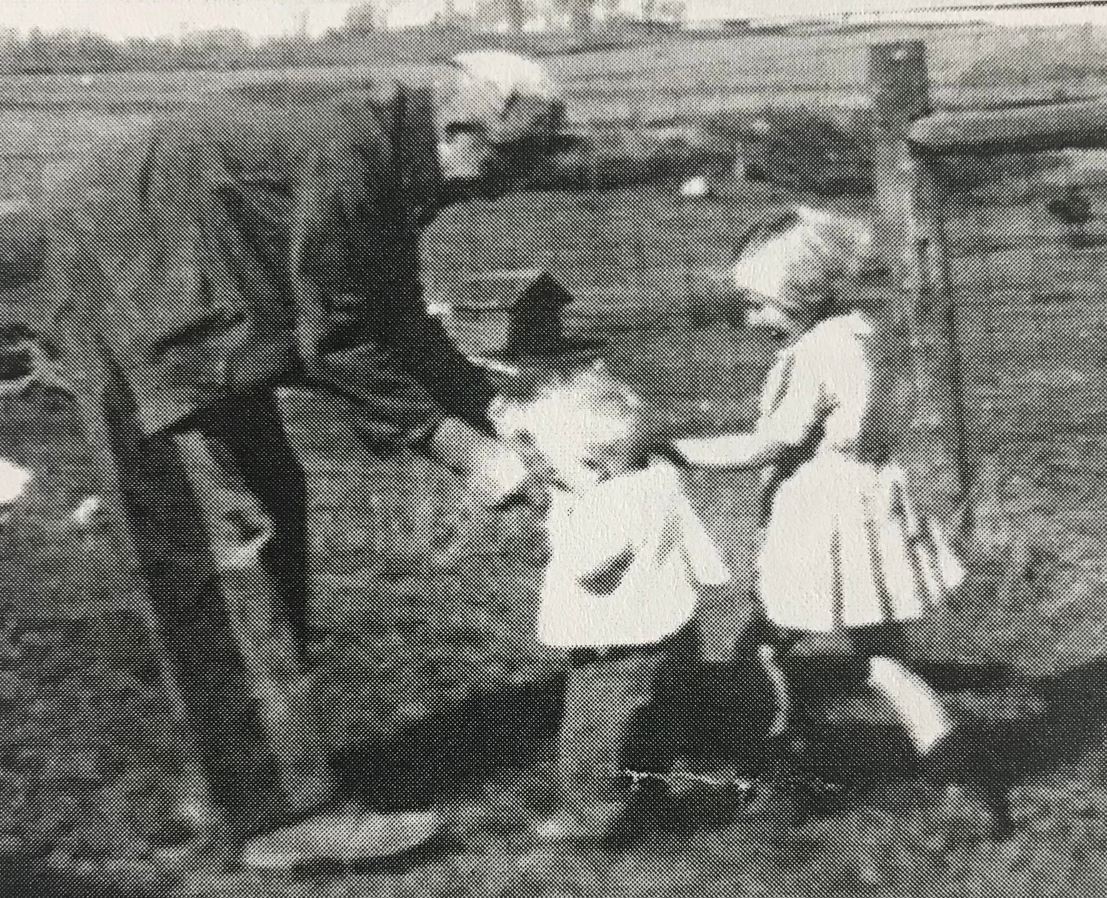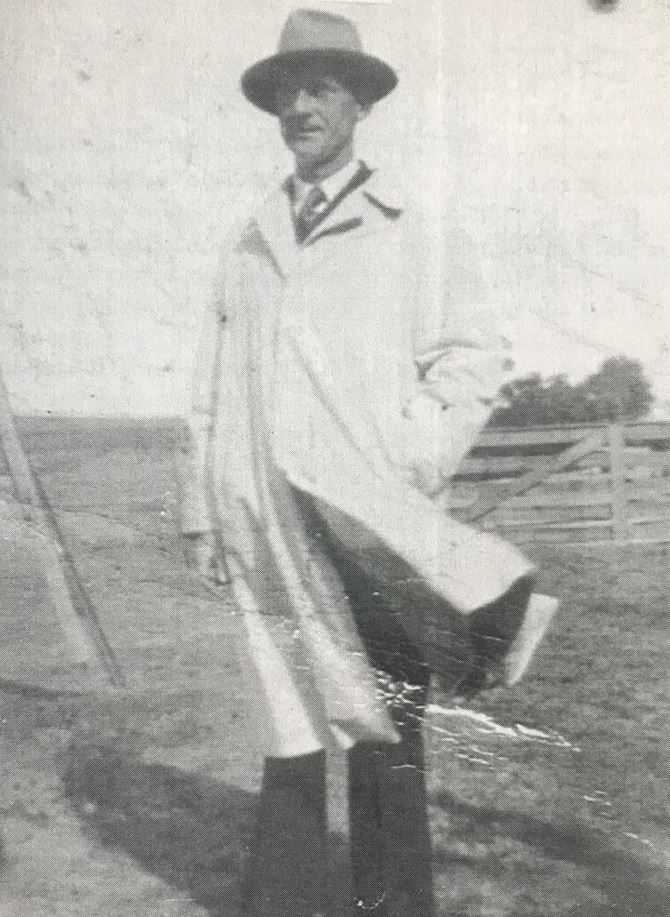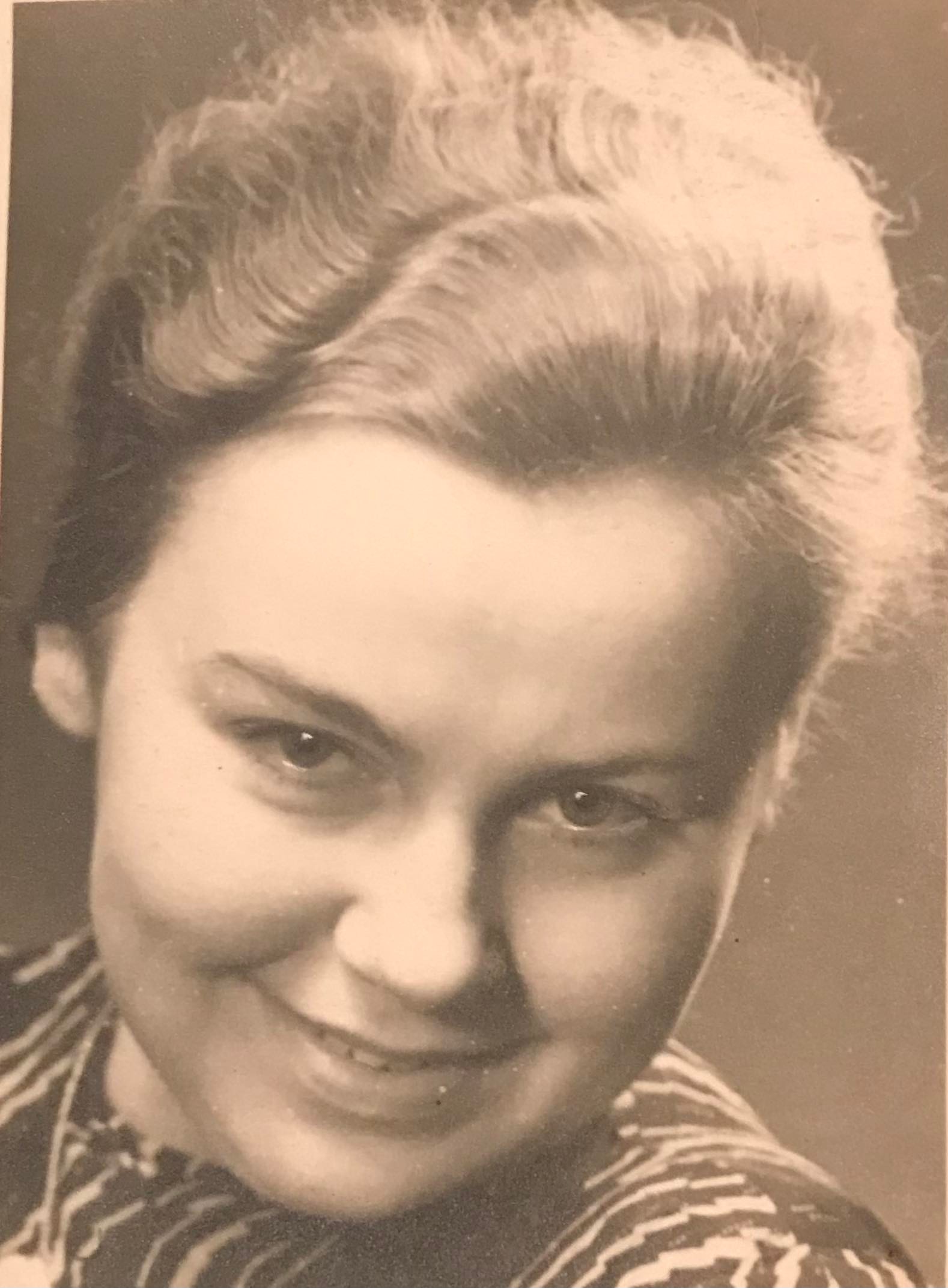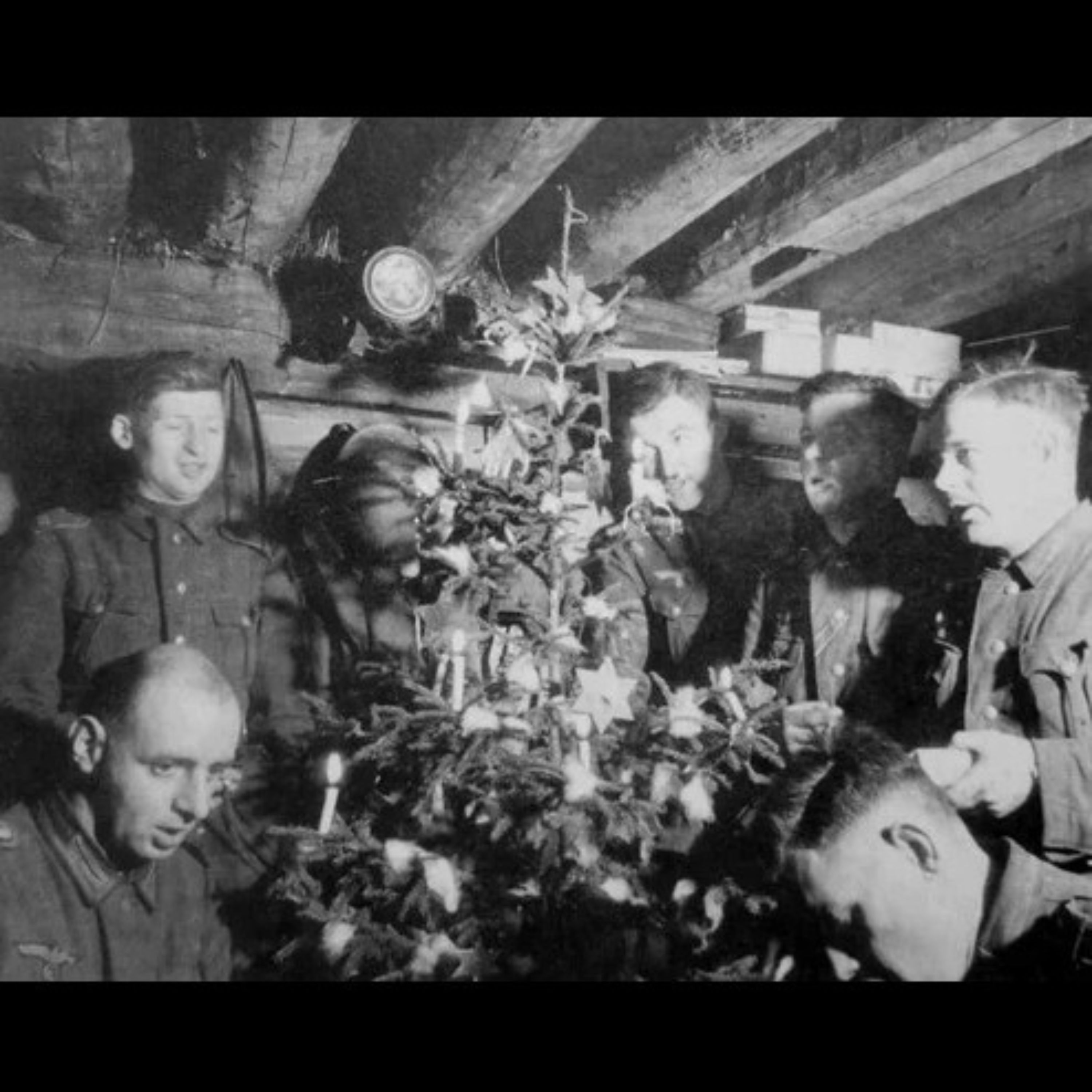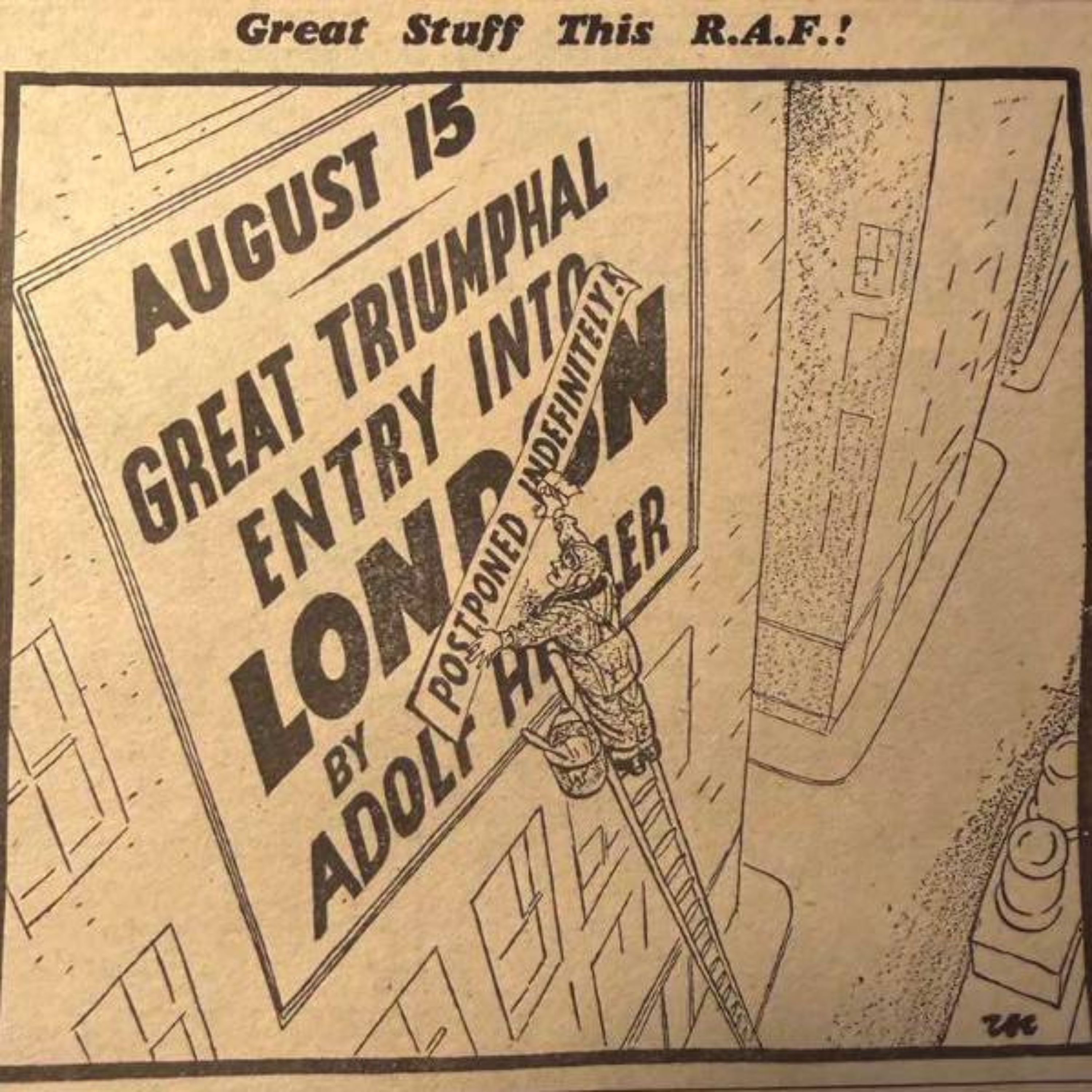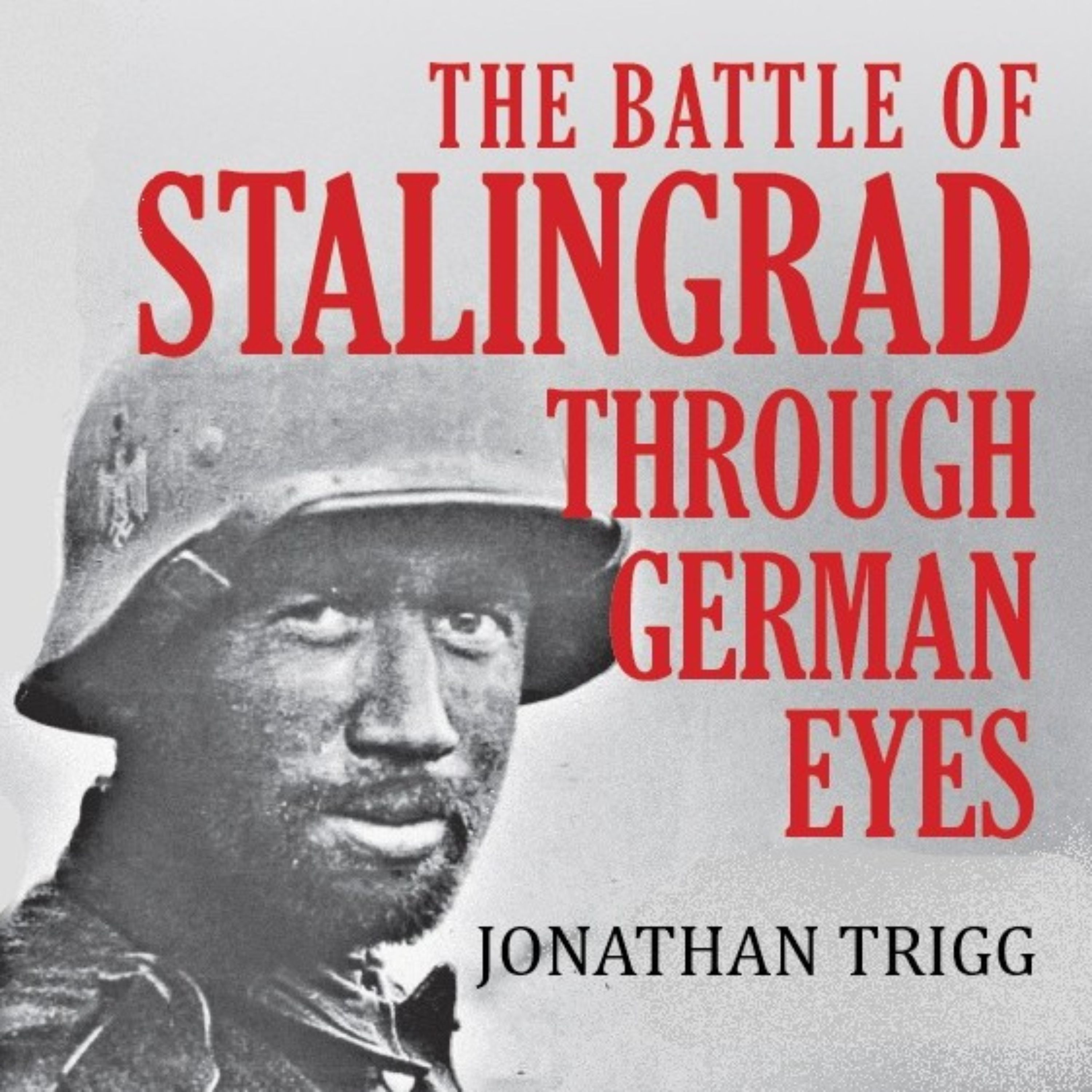79 German Submariner Part 2: Atlantic, POW in Canada.
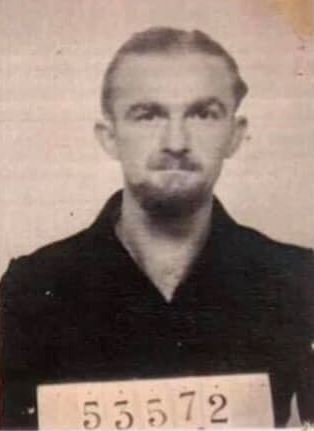
Kurt Schoenthier, U-Boat U-111
A thrilling Part 2 of German submarine U-111’s tour of the North Atlantic during the second world war. By Kurt Schoenthier. Sinkings, survivals and POW's. Plus stacks of family stories and more.
Song For The Bad Guys
from Next Exit From Babylon by Nick Feint
For anyone interested in downloading or hearing more of Nick’s songs, there are 11 tracks on his brand new album.
There’s a link to the bandcamp website in the shownotes and that’s where Nick’s music is hosted.
https://nickfeint.bandcamp.com/track/song-for-the-bad-guys
Nick's Facebook page
https://www.facebook.com/stonearrowj/photos/a.262053427765502/938194986818006/
Royal Army Chaplains’ Museum, Army Museum, Swindon, UK.
https://royalarmychaplainsmuseum.business.site/?utm_source=gmb&utm_medium=referral)
Chris Willet’s family history – Ted Dimmock
https://www.family-treasure.com/greenhowarddunkirk
Western Approaches museum
https://liverpoolwarmuseum.co.uk/
Military Combat Stories
https://www.facebook.com/groups/776796136302975/?ref=share
Battle of the Atlantic Facebook page.
https://www.facebook.com/groups/140314613337524/?ref=share
Full show notes, photos and transcript at:
https://www.fightingthroughpodcast.co.uk/79-german-submariner-and-pow-part-2
Reviews on main website
https://www.fightingthroughpodcast.co.uk/reviews/new/
Apple reviews - https://itunes.apple.com/gb/podcast/ww2-fighting-through-from-dunkirk-to-hamburg-war-diary/id624581457?mt=2
Follow me on Twitter - https://twitter.com/PaulCheall
Follow me on Facebook - https://www.facebook.com/FightingThroughPodcast
Interested in Bill Cheall's book? Link here for more information.
Fighting Through from Dunkirk to Hamburg, hardback, paperback and Kindle etc.
Nick Feint - singer of Song for the Bad Guys
U-111 Submarine - North Atlantic
1 Kurt Schoenthier aged 19
2 Captain Wilhelm Kleinschmidt is handed the “keys” to the boat
3 Captain Kleinschmidt U-Boat commander WW2
4 Part of the crew of U111, my dad in the middle
5 Playing an extra in the movie, escaping from the sub
6 U111 in the cold WW2 North Atlantic
7 - U111 in WW2
11 Kurt Schoenthier POW WW2
12 In the winter of 43, my dad was a POW in Canada, in a small camp on the Quebec side of the Ottawa river. They were cutting trees for a company.
13 WW2 POW camp
14 “TRAPPER JOE”
15 1946. My dad worked as a farmhand in southern Ontario. Playing with the farmer’s kids. Red POW stripe on his pants and red bullseye on his back
16 1946. The farmer and family wanted to take my dad to the fair. They let him wear these clothes to conceal his POW status on a hot summer day. The farmer would have been in deep trouble if caught
My Mom aged 21
PART 2 –
Fighting Through WW2 Episode 79 – German Submariner and POW, Kurt Schoenthier – Part 2.
During the night, 4 more ships of our convoy had been torpedoed by midnight and it became clear that U-Boats were operating among this convoy, surfacing and firing torpedoes at will.
While we were recovering the survivors, our sonar operator reported a U-Boat echo, which placed it directly under our stern. There was only one answer, to get away quickly and depth charge.
I was in the bow sound detecting station, at the very front of the boat. The engine sounds of our attacker were pounding in my headphones. He was directly over us! Then, four splashes and seconds later, four explosions rocked our boat!
They went down the driveway and hollered out to the neighbor but did not get an answer. They checked the outbuildings and no sign of him there either. They went down to the cellar from the outside entrance and were astonished at what they saw.
Welcome back to part two of this splendid memoir of a German submariner in the second world war, fighting in the cold North Atlantic. And if you want to see just how cold, check out Kurt’s brilliant picture set in the full show notes.
And if you didn’t get the hint in those intro passages, I’ll mention that I’ve managed to dig up another North Atlantic memoir to share with you where the coincidences are almost too spooky to contemplate. Keep listening for the PS. Oof my word!
And more details later of Kurt’s memoir which has been superbly published by son Rainer in The German Immigrant – more info on that at the end of the show.
We left the last episode witnessing Kurt’s scary initiation ceremony on crossing the equator for the first time. Well, he got through that in one piece and we catch up with Kurt cruising the Ocean once more looking for enemy ships.
TR
The sinking
My dad was a wireless/radioman on U-111.. This is how he recalled the day of their sinking.
“I was in the bow sound detecting station, between the torpedoes at the very front of the boat. The engine sounds of our attacker were pounding in my headphones. He was directly over us!!
Then, four splashes and seconds later, four explosions rocked our boat!....Depth charges!...deafening thunder, amplified one hundred fold for me through the sound detector headphones!
My eardrums! For several moments I was stunned and couldn’t hear a thing.
In bewilderment I turned around. Everyone was gone!
As I took off my earphones and began to regain my hearing, I heard machine gun fire.
We were on the surface!
Then the sound of our 2cm gun firing.......Another explosion!....I hurried towards the radio room...nobody there!
I got to the control room just as Steffeck’s lifeless body fell to the floor in front of me, the right side of his body mutilated. The sweet smell of burnt flesh and gunpowder brought me to the brink of vomiting.
Then I saw Haberstroh coming down the ladder, his face white as a ghost and shaking terribly.
“ Stay down here “ he shouted to me. “They are all dead up there “.
He had manned our 2cm gun, when a direct hit from the enemies 4” gun exploded on the bridge of U-111, killing captain Kleinschmidt, lieutenants Fuchs and Roesing, and gunners Gross, Puehlhorn, Diephold and Steffeck.
Meanwhile, our 10.5 cm gun at the bow, just in front of the conning tower, was manned by four men, awaiting ammunition. Steffeck and the captain were bringing up a shell for this gun when the 4” shell from the enemy hit , killing both. Seconds later another shell exploded behind our 10.5 cm., wounding two men and damaging the gun.
I was still in the control room when lieutenant Wulff came running from the Diesel engine room....” Everybody off the boat... we’re going down! “
I realized that I had to find a life jacket if I wanted to survive....oh yes... did I mention......I CAN’T SWIM!! Anyways, mine was stored in the radio room under the seat.
But it’s gone!
Another shout through the bulkhead....” Everybody out!...we’re going down! “
Finally I found a swim vest, and while blowing it up through the mouthpiece, I rushed up the ladder to the conning tower.
I glanced over, and there, sprawled beside the periscope, I saw the upper body of captain Kleinschmidt. His body had been torn in half by the shell......
I reached the conning tower where a large hole had been blasted through the wall, and there sat Fuchs, a smile on his face, and a huge hole clean through his chest and not a drop of blood!
Then four more bodies across my path.
I slid down the ladder to the deck.
In the distance I saw our attacker, with a small British flag on her mast, and a quick thought ran through my mind... “ the enemy..... what are they going to do to us.”
I noticed that in the water between them and our boat, some of my buddies were already swimming.
Lieutenant Wulff came sliding down the ladder shouting “ get off the boat... get off the boat”.
Hannes Znottka, Hein Riemann, Walter Bittner and myself stood on the edge of the boat, now knee deep under water.
“ We’d better be jumping!” said Hannes.
We jumped, and after a few seconds in the water I heard someone shout ....
“ Our Fuehrer, our Fatherland, U-111.....Hurrah, Hurrah, Hurrah”.....
And the rest of us answered “ Hurrah, Hurrah, Hurrah!! “
I turned around to see the bow of our U-111, straight up in the air,
and then slowly slide into the depths!
Gone!!
My dad watched, as his boat slowly disappeared beneath the waves.
He recalls what happened next!
“ U-111 is gone. I CAN”T SWIM , so now my life depends on my life vest.
Luckily, the water is warm, and only slightly rough. The waves were high enough, however, to cover my view, and I can’t see the others.
I am alone!!
I can still see the ship that sank us, but it is sailing away!
They are leaving!
But this isn’t the only fear getting a hold of me.....I realize my life vest is leaking!!
The right side of the vest has gone flat and I am floating lopsided. The vest has several separate compartments
and two of them are leaking!
Frantically searching, I notice the cause. Two small holes, about 2 inches apart, and the thickness of a pencil!
I’m scared stiff.....
I feel myself starting to panic..
I begin to lose hope.....
I am going to drown.....
It is just a matter of time.....
In a futile attempt, I shove my fingers into the holes and keep blowing air into the mouthpiece, desperately trying to keep it inflated and stay afloat!
Using only one arm to move about, I am losing all sense of direction. I can’t see any of the others.
I begin to shout “ Hilfe”. ( help).
Then my call is returned! Hilfe!
I turn around and see Alfred Harm! He is about 50m away, frantically shouting and waving his arms.
Then, as I look in his direction, I can suddenly see the bow of our attacker behind him!
It is coming straight at us! In a few seconds it stops right beside me!
It has now been over an hour since U-111 went down, and the British didn’t leave. They have been circling to find survivors!
Freddy and I are the last two in the water. We could easily have been left unnoticed!
If not for the humane actions of the ship’s captain, who kept circling just once more, in case there were any stragglers like myself and Freddy, I would be gone!
I am almost touching the wall of the ship now. It is slowly moving forward and then I’m hit by a rope ladder dangling over the side.
I look up, and someone above is motioning for me to climb up!
I am so exhausted I can’t even manage to pull myself out of the water, much less climb up!
In a desperate struggle, I finally manage to hook one leg through the bottom rung, and sling one arm over another.
Then I lock hands and try to gather my strength for an attempt to climb up, when to my astonishment, I suddenly begin to rise out of the water!
I was being pulled up by two British sailors!!
As they help me climb over the railing, a third sailor is pointing a gun at me and says “ HANDS UP!”
I have no idea what he is saying.
Upon seeing the unintelligible look on my face, and seeing how exhausted I am and wearing only a pair of shorts, I must appear to be pretty harmless.
So, he says “ OK-OK” , lowers his gun and helps me climb on board.
Now the four of us are standing face to face.
The one with the gun is pointing it at me again.
We stare at each other for a few seconds.
Then one of the two that had pulled me up out of the water steps toward me!
Instinctively, I take a step back.
He takes another step toward me.
I brace myself for the worst!
Then he lights up a cigarette and hands it over to me!
“ Smoke?” He says!
No knowledge of the English language is needed for me to understand this!
I will never forget this gesture!, thinking that only a short while ago we were trying to kill these guys and they were trying to kill us!!
But now, the enemy suddenly had a face, and they had saved us!
Along with my feelings of fear and uncertainty, I now also felt a sense of relief......... as I realized that I had stepped off the “DEVIL’S SHOVEL” once again!
Rainer:
My dad and Freddy were the last of the crew to be pulled out of the water.
They both went on to live long lives.
They were the last two of their crew to die.
Their birthdays were on the same day.
They passed away within a short time of each other.
1941 CAPTURED
“THE LAND OF MILK AND HONEY”
Rainer:
On Oct. 4, 1941, my dad’s boat, U-111, was sunk.
Survivors were rescued and taken aboard by their attacker, HMS Lady Shirley, a fishing trawler that had been converted to a submarine hunter. They were then transported to Gibraltar, where they were held for a few weeks, and then they were..........well, I’ll let my dad tell it from here.........
“After a few weeks in Gibraltar, rumours began to spread, about a transfer to Australia, or England or even Canada! I knew that some of my friends, fighting on the eastern front, had been captured by Russian troops.
My mind drifted to something my father had said a few months earlier, during my last leave home. He had been a soldier in WWI, two years in France and two years in Russia. His opinion of the Russians was low.
“Son” he told me. “I am glad you are fighting in the west, and even though we were enemies, we always respected the British for their fairness.”
The rumour of a transfer soon became fact. We were being shipped to England. We were loaded onto the aircraft carrier “Argus” escorted by two cruisers and three destroyers.
We entered the Atlantic. Unlike the violent movements of U-111 in the high seas, this large monster of a sea vessel tried in a quite different way to twist our guts! The heaving upward motion seemed endless, and so did the dipping back down.
But no matter how hard “Neptune” tried, our seasoned bellies refused to give in, and we consumed every bit of the excellent sailor rations that we received!
Things are going to be different as soon as we are put in a POW camp, we were sure of that!
Especially on the British isles. Food supplies must be getting short there, the way our subs are controlling their shipping lanes!
Hell, why are the English going to all this trouble anyway? The war will be over shortly. Why don’t they just send us home? We were quite certain there would be peace with England, after our soon to be victory over Russia!
This kind of optimism carried myself and others through all the weeks, months, and years of captivity ahead.
After a few days we arrived at our destination, and the Argus dropped anchor at Greenock.
News of the arrival of a captured u-boot crew had spread quickly, and there was a rather large crowd waiting alongside the pier.
But wait a minute!
This reception looked different from what we were accustomed to!
Where are all the friendly girls, the brass band and the Admiral?
No, we were in enemy territory now and we got what we deserved.
Jeers and boos, throat cutting gestures, S.O.B.’s and other names shouted in our direction.
What else could we expect?
The guards escorted us past the crowd to an awaiting bus.
“Quick, quick..... mucken shnell, mucken shnell!!”
This we understood, and had heard many times already.
The windows of the bus were painted black, only a small strip at the top was left clear. Behind the driver, a curtain blocked our view to the front.
“Nobody stand up or we’ll shoot,” a guard hollered. There were three armed guards at the front of the bus and two more behind us.
We started talking among ourselves.
“Shut up...no talk”
One of us raised his arm.
“I go toilet?”
And the swift reply...
“You wait... go toilet in camp”
Then two more arms in the air!
“Me toilet please?”
The two gave the impression that soon something disgusting was going to happen.
“Diarrhea” another one of us shouted.
This broke the guard’s resistance and the bus stopped. The three complainers were told to get out, along with half a dozen others who now also suddenly had to “go”.
The rest of us rose and peeked out through the clear glass at the top of the windows. We had stopped on an isolated stretch of road, and the guys were told to do their “business” on the roadside.
After some stalling and goofing around, a sudden gunshot in the air by the impatient guard brought things to a quick end and everyone was rushed back on the bus, with or without “business” completed!
The truth was, no one really had to “go”. It was all just a dumb joke, but we had something to laugh about.
Then we arrived at the camp. It would be the first of several in England. As we had anticipated, the food supply was low and the weather was cold. What news we had of the war was not good and as the weeks and months wore on, I slowly became very depressed. My dream of the war being over and being home by Christmas was gone.
A rumour had begun to spread that we would be transferred to Canada. It turned out to be true.
England was having enough difficulty feeding her own people, let alone a bunch of enemy prisoners. Why not ship us to Canada where there was food aplenty?
I watched enviously as some of my friends were picked to be sent to the “promised land”.
For many of us the word “Canada” meant something like “the land of milk and honey”.
We imagined it to be as in the books we had read as kids. Wide open skies and vast forests, lumberjacks, prairies, huge Buffalo herds and of course, Indians!...
We were willing to gamble a couple of weeks of fear to get there. Fear of going in a convoy, and being sunk by one of our own U-boots!
My name was on the list for the next to go, along with a few others from our boat.
We hoped for fog and a fast ship.
Several hundred Canadian soldiers were also on board, and we were separated by barbed wire.
One of us called over to the other side “ How do you guys like being behind barbed wire?” A few more friendly jabs were exchanged, and soon we were all joking and talking.
We traded uniform buttons, swastika emblems and so on, for chocolate bars and cigarettes!
We got our wish, as it turned out to be a speedy crossing, and we soon approached the Canadian eastern seaboard.
The crew of U-111 remembered this area all to well, as only ten months ago, we were patrolling these very waters, searching for a vessel like the one we were on right now.
At that time, a thick layer of fog, had begrudged us the opportunity of finding a target.
Would the fog, our nemesis from then become friendly and protect us now?
It did.
Because of the protective fog, our journey took a day longer, but when it lifted there it was................
CANADA!
The land of milk and honey!
U-111 The land of milk and honey continued.
A long train was waiting for us at Halifax.
“Good lord, those pioneer coaches are huge compared to our trains back home”.
Armed guards were stationed at both ends of the coach.
“The luggage compartments are to be used for storage of your belongings only, not for sleeping, so you can’t cut your way out to freedom at night”. And also “Not more than one at a time to stand up”.
One of us asked “when are we going to arrive at camp?”
“Won’t be long, two days or so”
“Two days!....so we go to B.C. ?”
“Hell no, that would take six days, this is Canada you know”
One of us tried to be funny....”You have lots to eat in Canada ?”
“We are growing enough to feed the whole world, if you S.O.B.s would only let us ship it to everyone”.
“ Just get us some of this stuff now please, we’re starving!”
“Wait until the train is moving”.
Finally, the train started to roll, and the food came as promised!
Crates of apples first, then loaves of white bread followed by an abundance of sausages!
Many of us heard the word “ baloney” for the first time. It soon became our universal name for any type of sausage.
And then....Coffee! Real coffee! Made from coffee beans!
We praised Columbus for discovering America!
The train rolled on. Westwards. Always westwards. Bush, bush, and more bush.
The landscape confirmed our conceptions of the land. Trees and lumberjacks.
A dogsled running alongside the train caught our attention. But our hope of a gang of Indians attacking the train was not realized!
We had all played cowboys and Indians during our childhood, based on books we had read about the great tribes and chiefs.
But then came Hitler.....and we switched to playing soldiers and war.
It was undeniable, even at night, that we were riding through a strange land.
Finally, the forest opened up, and there it was.....our first home in Canada.....camp #23, Monteith, Ontario.
Watchtowers and barbed wire.
There were 1600 of us in camp.
Initially, life in camp was boring. There were daily duties like kitchen work, camp maintenance work and so forth. The international Red Cross, Salvation Army, and the YMCA provided books for the library , including books from Germany!
Our soldiers salary payments were continued and transferred to our bank accounts in Germany. Part of it was sent over for our disposal. General men received $6.60, non-commissioned officers $11.00 and officers $30.00 per month.
The general store in camp became a “money magnet”. It had a selection of toiletry articles, smokes, chocolate, razor blades, etc.
A pack of twenty smokes was 20 cents, a bar of soap 7 cents.
Some of us got to work outside the camp. General maintenance of roads, barracks of the guards, laundry, unloading of supplies etc. The pay was 20cents for a six hour day, while in-camp work was not paid.
One day, Alex, our work manager, asked for two volunteers with painting experience. No arms went up.
My friend Karl elbowed me in the ribs and said “common let’s try it.”
I said “OK, sure, how hard can it be?”
Our task was to paint the outside of a small shed that housed the camps fire truck.
At days end, the guards were pleased with our work, and asked...” do you guys want to do more paint work?”
“Hell yeah” we replied.
What an opportunity. We now had a supply of paint that we could trade to the other guys for smokes and chocolate.
A lot of guys spent their time tinkering, making little models and so on out of wood, and they needed paint. And now Karl and I had it.
Every day for the next six months, our names were automatically called for paint work!
“Schote, Schoenthier” became a routine sound to be called out every morning by Alex!
And we knew just how to smuggle the paint back to the guys.
Small glass jars like mustard jars, and small tin cans, filled with paint, and fastened to a string, dangled safely between our legs, and passed through countless body searches back into camp. We knew the guards were to embarrassed to get to close to “that area” during their searches.
More and more of the men became aware of our little enterprise, and no matter how much we supplied, we couldn’t keep up with the demand.
Business was booming!
We figured that our crime of stealing was offset by the “good deed” we provided towards our fellow prisoners.
Besides, if we were caught, what would they do? Throw us in prison?
The appearance of the mailman was always a favourite part of the day, although all to often it was sad news from home. In the first six months, three of my best friends from home were killed, followed shortly by two more.
Many others, serving on various u-boots were listed as missing in action. We all knew what that meant. In 1943 we lost 42 subs in one month alone!
Susie and Nelly were two of the most popular characters in camp.
We had found them, motherless, wandering alone in the bush. They were two orphaned Blackbear cubs.
The camp commander allowed us to keep them, and they quickly became our favourite pets. They were allowed to walk freely throughout the camp.
They were housed in a small log cabin in the middle of the camp, and received meals in their own quarters.
One day, Susie got into an altercation with one of the guards, during which she nibbled slightly on his butt!
Unfortunately, both her and Nelly had to pay a high price for this insubordinate behaviour, and they were now fenced in to a small enclosure around their cabin.
To our amusement, they still could enjoy chasing each other up and down a big old tree, and sliding under a little bridge we had made for them!
As time went on, they became to big for this, and one day Nelly got stuck. Destruction of the bridge was the only way out.
Both seemed to enjoy their life as fellow “prisoners”. Their “world” was their territory of the camp, but inevitably their inborn desire for freedom developed, until one day it became powerful enough for Susie to break through the fence of their little home.
Obviously excited, and bewildered about the success of her breakout, Susie ran to the camp fence and climbed over... only to be shot and killed moments later.
Nelly, after watching what had happened to her sister, got frenzied, and as a “precautionary measure”, was also shot and killed.
...........The flag was flown at half mast that day.
1943 “TRAPPER JOE”
In 1943, my dad was a POW, working in a lumber camp, deep in the bush of northern Ontario.
POWs worked alongside professional Canadian lumberjacks, and quickly learned the tricks of the trade.
Working largely unsupervised, this was like freedom, compared to the fenced in and guarded main camp back in Monteith.
A few days after Christmas of 43, they were given a couple days off.
Just on a whim, my dad and two buddies asked the sargeant in charge if they could do a little cross country skiing, and to their surprise, the answer was “yes!”
I’ll let my dad tell the story....
“We had made ourselves three pairs of skis. We cut a seven foot long log, stroke by stroke lengthwise, until we had the six strips ready.
Then we planed them, with the homemade plane that Hannes, who was a blacksmith back home, had made.
He also made the flat iron for the tips, which we had bent after getting them soft and flexible over the steam from boiling water.
Ernst, who was a skiing expert back home, had made the binding for us. It was no patent binding however. Once tied to the boots, they were on to stay!
“Look sarge, we don’t want to escape, just have a little hike inland, you know. Only two days at the most, and we’ll be back by the evening of New Year’s Day!”
The sargeant was a softy. He said”Yes”. But then he also added....”If you aren’t back in time you will be caught and shot!”
He knew darn well how senseless it would be for us to try and make a run for it in the middle of winter up north in the Canadian bush with no supplies.
“Say hello to trapper Joe for me if you find him” he said.
And that was our plan.
Trapper Joe was an Indian who had passed through the camp a few days earlier.
He had told Karl and me where he would go, and for us to come and visit him, for a cup of coffee.
And so, we set out. Hannes, Karl and myself, on our homemade skis, into the wilderness.
It was a beautiful day. Bright blue sky, no wind, about -30 C. One of those wonderful, crispy winter days there are so many of in Canada’s North.
We pushed on, and after about three hours, we came upon the lake Joe had mentioned.
“You’ll see a rocky hill on the other side”, he had told us. “This is where I will be.”
The lake measured about three kilometres across, and the rocky hill was clearly visible on the other side. Behind the hill rose a thin sliver of white smoke, rising straight up into the blue sky. Not the slightest hint of a breeze was perceivable!, and there was complete silence.
For several moments the three of us just stood there in awe and admiration, captivated by the beauty of the majestic scene before us!
Almost hesitating to disrupt this heavenly peace, we slowly let ourselves glide downwards, onto the frozen lake, and with long strides, continued to search for the trapper.
We found him!
At the south side of the hill, the rock rose up rather steeply, and close to it, Joe had stretched a canvass over two wooden poles to make a shelter. He had left a narrow slit, for the smoke from the log on his campfire, to escape.
“Hungry?” he asked. And his weatherbeaten face grinned as he said “Welcome”.
Another log, a few feet away from the burning one on the fire, provided enough sitting space for the three of us.
Roasting over the fire was a rabbit he had caught, in the hope that we would keep the promise we had made, to come and see him.
A pan, a kettle and a metal mug, was all he had.
He put the rabbit on the pan, scraped off the burnt flesh with his huge hunting knife, and cut up the rest. He then offered for us to help ourselves.
“Not bad!......Wunderbar!”...we offered, with what little English we knew, and he acknowledged our compliment with another wide grin!
The coffee he had brewed was ready too. Hot and bitter, it nevertheless tasted good after our long stretch of skiing this morning.
There was no big conversation, other than him going over to his sleigh to uncover it and show us his collection of furs.
A narrow line of clouds was forming on the western horizon, and Joe warned us that snow was coming.
“Better be heading homewards, don’t want to be caught in a snowstorm!”
“Many thanks Joe!”
He grabbed our hands and shook them wildly. “Come again, come again!”
And so, we took off, homeward bound.
If this was summer, we would be tempted to forget the camp, and just keep going! The sargeant had given us a couple days headway. But don’t kid yourself. In the summer he wouldn’t trust us this way.
Nevertheless, an idea was born.
In the spring, we would build a raft................and sail to freedom!
Winter 1943 ON THIN ICE!
In the winter of 43, my dad was a POW in Canada, in a small camp on the Quebec side of the Ottawa river. They were cutting trees for the Gillies Bros. Lumber company. The logs would be loaded onto large trucks and driven to the trains at Chalk River on the Ontario side.
It was hard work, but they enjoyed it. They worked mostly unsupervised, as any attempts at escape in this frozen wilderness would surely end in death.
During the cold of winter, when the river froze, the trucks would drive across it on the ice, roughly half a mile, saving them considerable time.
Most of the time things went smoothly.
There had however, been a bit of a mild spell, and the ice wasn’t quite as solid as the truckers would like it.
One by one, they took their heavy loads across the treacherous ice.
Then it was Jack Robichaud’s turn.
My dad went back and found the old camp 45 years later, in 1988, and was able to get in touch with Jack, who still lived in the area.
Here, in his own words, Jack Robichaud tells the story.
“It was February, 1943. Temperatures around -20 F, snow about 24” deep. It was a mild spell!
POWs were cutting lumber in the laurentian hills for Gillies Bros lumber company. They would haul the logs on big sleds down to the river, where they were loaded onto our trucks.
About 15 local truckers, including myself, were hauling the logs from Schyan Point on the Quebec side, across the frozen Ottawa River to the trains at Chalk River, and transported south.
That morning, my brother in law was the first to cross, and made it to the Ontario side safely. He was not aware of what was happening beneath him. The ice was about 24” thick, but due to the extreme low temperature, the ice had shattered with the weight of the truck.
A second truck followed, Madore, from the town of Arnprior. Just 300 yards from the Ontario side, his truck began to sway, and started sinking. He jumped from the cab safely.
I had just come off the mountain with a full load. The driver for Madores truck was running across the ice to warn me, but I was already on the ice. I turned and headed back for the Quebec shore.
Within seconds the rear of the truck broke through the ice. The front wheels of the cab were in the air, and it broke loose from the loaded trailer.
I jumped clear of the drowning truck. The motor was still running. The cab went down in a depth of 97’ of water, however the loaded trailer floated in the broken ice.
The POWs came and helped me unload the wood and clear the ice. It was extremely cold, difficult and dangerous work. They worked side by side with me. I was very grateful, since this was my only source of living to support my family.
Some of the men were divers on their German ships. They lamented that if they had their equipment, they could have raised the truck with no damage.
The next day, one of the men who was a blacksmith, forged some grappling hooks. They dropped the hooks below the ice, and attached with ropes to a team of 4 horses.
Up came the hood and one fender. On the next try we retrieved a door. Then , we caught on to the frame of the truck. It was submerged in mud. In order to lift it, another truck and the horses pulled together.
On the fifth day we hooked on to the rear end. As we worked in the freezing cold, the POWs kept a huge bonfire burning close by. We took breaks for hot tea, blackstrap molasses, bread and balogna for lunch.
There was a good rapport between the POWs and us Canadians. I brought them candy, cigarettes and newspapers.
There was lots of good natured teasing from both sides, regarding events in the ongoing war.
I much appreciated their willingness to help me.
Jack Robichaud
“ Not long after - the warm spell was over and the ice became usable once more as a temporary highway for the truckers and also for us POWs to cross and return to the main camp at Chalk River.
With melancholy in our hearts, we left behind the feeling of a little bit of freedom, and the echo of the Lumberjacks calls.....TIIIMBERRR!!!!, didn’t make our departure any easier!”
Summer 44 MEDICINE HAT
“It was late summer, 1944, and I was a prisoner of war in camp 132, Medicine Hat, Alberta, Canada.
For 2 long years, no new prisoners had been added to the camp to join us.
Suddenly one day, quite a contingent of new POWs arrived.
We gathered at the camp gate and watched as they were slowly marched in.
I quickly saw that there were some older navy men among them!
I noticed that two of the new guys kept looking over at me, and then one of them shouted.....“ Hey Kurt, what a place to meet again eh!”
I didn’t recognize them and a thought flashed through mind as they hurried in my direction with their arms outstretched to greet me.
“ I’d sure like to know who the hell these old guys are!”
They were two u-boot men obviously, because I noticed the decorations on their chests.
But why would the navy all of a sudden have 60 year old men in the u-boot force? Were they now drafting men from WW1?
I couldn’t figure this out, but gradually they began to look familiar.
As they were practically tearing out my arms shaking hands and hugging me, I desperately concentrated, trying to recognize them, and then one of them said:
“ Oh Kurt, where did the time go?
I see you are puzzled!...Four years ago?.......u-boot school in Neustadt?.......don’t you remember?”
Now it was coming back to me.
I felt embarrassed that I hadn’t recognized them.
This is Georg Salzmann and Gerd Zimmer! My friends from u-boot school!
But their features?! Their faces!
They weren’t 60 year olds, they were 24, same as me! The only difference was they had not been captured until just a few weeks ago.
One of them had weathered 19 combat patrols and the other 17 patrols while serving on various u-boots.
They were highly decorated and advanced in ranks, and I envied them both.
But only for a second or so.......
Then I realized the price they had paid....the toll the war had taken on them, physically and mentally, turning them into almost unrecognizable old men.
“I realized once more how lucky I had been, to be sunk and captured in 41, and then become a POW in Canada!
Summer 46
Yes. Especially in Canada.
In the summer of 46 while still POWs up north, they were given the opportunity to work on farms in southern Ontario. My dad decided to give it a shot. They were brought to a small camp near Fingal Ontario. Here’s a piece from his book of how he described it.
“I was picked up at the Fingal camp by a man named Bill Dufty, who was there to take me to my assigned farm as a helper
“Call me Bill” he said. “And what is your name?”
“Kurt Schoenthier, but call me Kurt” I replied.
Smiling, he shook my hand and responded “Kirk eh?, did I say it right.”
He swung one of my heavy sea sacks over his shoulder and we walked through the camp gates to his car.
“We’re going to my nephews’ farm, it’ll take about 20 minutes”
Soon he slowed down.
We had arrived at the farm!
“I got out and opened the gate at the end of the long lane that led to the farm and I noticed the name John McKinlay on the mailbox.
As we drove into the yard I saw that John was already there to greet us!
He was exactly what I had always pictured in my mind, what I imagined a farmer to be!
Tall, strong and proud. Blue coveralls, blue and white striped engineers hat, and a big, warm, friendly smile.
Before we came to a stop, a young woman stepped out of the house holding a baby, and a youngster ran past her in our direction.
I had just opened the car door and the little girl was already at my side, enthusiastically saying “Hi uncle Bill, is this the prisoner?”
His name is Kirk, Brenda.....Kirk! And this is what you should call him.
Bill rounded the front of the car and said “ John, this is Kirk Shont... Skont...aw forget it, just call him Kirk. And Kirk, this is John.”
John smiled and shook my hand in a way that immediately made me feel welcome and told me my place here would be as a co-worker and friend, rather than just “the prisoner”
“My name is Kurt, I explained, and as we spoke the woman came down from the porch to where we were standing.
“Glad to meet you Kurt, John said, and I’d like you to meet my wife Margaret, and Marg, this is Kurt. I said it right didn’t I?
Seeing my approving nod, John laughed at himself and said “ I didn’t know I could speak German!”
The baby was introduced as Doug, who couldn’t care less about me or my name, and quickly turned his head in the opposite direction!”
After a short farewell with Bill, we gathered up my sea sacks and turned towards the house.
Once inside, John pointed to a room and said: “ This is your room Kurt, and the tobacco stuff on the little table is yours. Make yourself at home. We’ll have lunch in a few minutes.
My own room! I couldn’t believe it!
Then at lunch I felt very much like part of the family - brought on by the warmth and unprejudiced feelings that my “new family” showed me.
I quickly realized I would need to improve my knowledge of the English language when little Brenda said “ You talk funny, Kirk!”
47-51
On returning to Germany in 47, there was nothing for him. His family farm in the old village was now part of Poland and lost to them for good. He now had no money, no property of any kind, no job or income or place to live. Finally located family members, married, had me. He bounced from job to job doing whatever menial work he could find. It was bleak to say the least. Then in late 1950, out of the blue, came the letter from friends he had made while a POW in Canada. Canada was now open to Germans, but needed a Canadian sponsor, which of course these friends would do. So in early 51 they came to Canada. My dad, my mom, his mom and me. Canadian economy was good and my parents took full advantage. They both worked like dogs, bought a home, started their own business and had a very successful life with many many Canadian friends. Both lived to their late 90s.
Thanks
Kurt passed in 2016. His son Rainer told me “I live in St Thomas, close to where he worked on the farm. In Canada he had a very full and successful life. Eventually buying a home, operating several thriving businesses – an auto repair shop, planted his own apple orchard with over 4000 trees, built cedar canoes plus more.
What a great payback to Canada on the kindness and hospitality it originally offered.
Rainer thanks for sharing your book with all us amateur and I hope some professional historians. Great effort.
Buy the u-Boat ww2 Book
On her second patrol, U-111 sank two more enemy ships before she herself was sunk on 4 October 1941 southwest of Tenerife, by depth charges from a British warship. Out of a crew of 52 officers and men, eight died in the attack; 44 survived.
The book is called ”The German Immigrant”
Discover what it was like to be a school aged boy growing up in Germany during Hitler’s rise to power! Join him through his teen years, u-boot school, war patrols, Lorient, meeting Admiral Doenitz, equator rituals, sinking in the Atlantic, captured, POW, lumberjack in the bush, escape attempts, Indian trappers, moonshine stills, ice road truckers, and much more.
The German Immigrant by Kurt Schoenthier is available direct from Lulu publishing, Depending where you live, you might find it on Amazon, Barnes and Noble and others.
There’s a link to Lulu in the show notes. Yes that’s the publisher, not the interior designer or the singer.
(Esoteric Brit joke I’m afraid)
Nick Feint
Another German connection
Whilst we’re on Germans in the war, up recently pops musician Nick Feint from New Zealand - and Nick has a fascinating family background that rings so many bells in other WW2 episodes we’ve heard in the past.
“I was born in Melbourne and my family are from there but we moved over to New Zealand when I was a kid so I am a Kiwi now.
I grew up reading war comics, playing with plastic toy soldiers and making up plastic models of various wars and having an idealised picture of what war was like. I was always upset that none of my relatives seemed to have taken a big part in the war.
My grandfather ran an Air Force Hospital on Papua New Guinea and my other grandfather was deemed essential to the war effort and stayed in Australia. The old guy that lived next door to me was an armourer on fighter planes in the pacific.
One grandfather witnessed an American bomber crash landing and burning the crew - and that was very upsetting for him.
I also had a great uncle Adrian Feint who was a stretcher bearer in WW1 on the Western Front and was mentioned in dispatches, he later became a fairly famous artist and worked on camouflage for the Australian army in WW2.
(You know listener I tried to buy some camouflage trousers the other day but I couldn’t find any – boom boom)
Later on I married a german woman and met her grandfather Herbert Schultz who was sent to fight on the Russian front for the german army at the age of 17. The first time I met him he told me how he was the gun aimer on an 88mm cannon facing 500 Russian tanks near the end of the war. He was blown off the gun 3 meters into a corn field and proudly showed me the shrapnel scars still in his leg. He went to hospital and ended up marrying the nurse who treated him who I also met!
He showed me his old black and white photo album with his war photos and pointed many photos of men and said "tot" (dead) until he grew too sad to go any further. He also showed me on a map the long retreat his unit undertook - they were sent to relieve Stalingrad and when it fell before they got there had a long fighting withdrawal back through eastern Europe.
None of his relatives showed much interest in his experiences and I think it was good for him to meet someone who wanted to hear. Later on he started a charity for Russian orphans - from Chernobyl - bringing them on holidays to his village in Germany, I wonder if this was part of his healing from his war experiences. He was very bitter about the bombing at the end of the war and had a theory that the allies kept bombing a lot longer than was necessary because of business interests in the arms industry.
I am a singer songwriter and I wrote a song for Herbert called "song for the bad guys" Herbert lived to 96 and only died a few years ago smoking and drinking schnapps to the end!
Nick Feint Takaka New Zealand
Nick thanks for writing in – I’ve just been playing the instrumental version of your music in the background and I’m going to play the full version to close the show so people can enjoy the lyrics too.
So That’s
Song For The Bad Guys
from Next Exit From Babylon by Nick Feint
For anyone interested in downloading or hearing more of Nick’s songs, there are 11 tracks on his brand new album.
Nick’s music is hosted on the bandcamp website and there’s a link to in the shownotes
https://nickfeint.bandcamp.com/track/song-for-the-bad-guys
Reviews
XIX
Excellent podcast - my grandfather was a Howard and I was a Howard
XIX
Keep the good podcasts up 👍
Robby big hill from Australia
Dan DCFRL from the USA
This podcast is a must for anyone who is interested in WWII history, especially if you want first-hand accounts from the Veterans who were there.
DCFRL Apple Podcasts · United States of America · 01/31/22
Happy Dad & Husband
Tell all your WWII friends, This podcast is AWESOME!
Paul Cheall is a wonderful storyteller, a dedicated historian and would give Sherlock Holmes a challenge as a detective.
John Muskego, Wisconsin
Apple Podcasts · Picking up on John’s exhortations to tell all your friends, tbh just two would do to massively uplift my download numbers - And to help you with that very task there’s a special Tell a Friend tab on the menu of the FTP home page WW2 – so please do spread the word about your favorite podcast!
And I want to offer a QUICK THANK YOU to everyone who consistently likes or shares my occasional posts on Facebook and Twitter. I don’t do that many because I feel my resources are best spent producing episodes. Thanks you to the following people amongst many others in this respect – I do notice your efforts and thank you so much,
Shout outs
Dek Whittle 2
John Dady 2
Marcel Girard 2
Lee Patrick 2
Gail Staples 2
Gabriel Cervantes 2
Danny Fontenot 2
Sue Weiss 2
Lee Owen 2
Matt Cain 2
Duncan Catmur 2
Tim raynville 2
Faye Pineda 2
Eddie Toms 2
Mike Watson 2
Wendy Andrews 2
And last but certainly not least, Tori Fairchild 2
There will be more of you and thank you all for your support from all over the world and I’m chuffed to bits - so in return that’s your five milliseconds of fame – well, at least I love you.
Dean bought me a good handful of coffees through the new Ko-Fi feature on the web site – look for the heart on the coffee cup logo – and cheers Dean – you’re keeping me keen!
Buy me a coffee – Kofi - Lisa Loftis
Also on Kofi - Just a token of thanks for the many hours of work you put in to each show. It's much appreciated. Every time I tune in, whether I'm listening to an episode for the first time or listening again to a favorite episode, I always learn something new. Your work is wonderful!
Lisa
Springfield, Missouri
Lisa had a request for help with tracking down her great grandfathers war history
Especially anything related to the headquarters company
John Cordial
82nd Airborne 505 Parachute Infantry Division ASN 15114301 Battalion HQ staff is all I have so far.
I can tell from the 82nd airborne museum that he participated in Operation Neptune and Operation Varsity. Jumped from a C-47 p
and on those operations Plan ID numbers were 43-15138 and 42-93544
He may have been part of Operation Husky and others but I haven’t been able to confirm that!
I’ve put some of the nitty gritty details in the show notes
I must admit this one is a long shot but if anyone listening has any ideas or tips for Lisa then I can forward them. But obviously Lisa check out the research tab on the FTP home page and see if you can grab the service record from the national military archives from your country. If you can get the service records of the individual that can then lead to the unit records – then – oof my word – you can start joining facebook forums that cover the areas in question. Then even oofer my word – you might even start buying ….. books! But a word of warning here – as soon as you start buying books – that side of your dwelling where the book shelf is gradually starts to mysteriously subside! One purchase leads to another and the next thing you know you keep adding to the collection to the point that you know you’ll never read them all!
The only works published now are 2 study guides I did for Author Jack Cavanaugh, links are on my bio. They’re great if anyone wants to study writing, primary age would be 14-20 year olds…but anyone could benefit from Jack’s book and my study guide.
Lisa asked me what Blighty was.
Lol. Britain. It’s slang not really used much now. As in a Blighty one - A wound serious enough to require the recipient to be sent home (to England) I’ll send you a link to all the slang terms. I’m adding to them as time permits! https://www.fightingthroughpodcast.co.uk/p/glossary-of-war-terms/
But does anyone know WHY it’s called Blighty?!
"Blighty" was first used in India in the 1800's, and meant an English or British visitor. I’ve added that one to the official FT glossary of terms which you’ll find a link to at the very bottom of the Home Page FTP.
Buy me a coffee 1 from German Christoph Keller
Hi Paul, just a small thank you for all the brave men and stories you have brought to us. I lost a good friend last fall who served with the BAOR The British Army of the Rhine in the 50's and I loved to listen to his stories and adventures.
He was Richard Yarwood the step father of my girlfriend. He grew up in London and during the Blitz him and his brother were evacuated to the Isle of man.
Later, when stationed in Hilden, Germany he was in the army cricket team and got to travel all over the place, even Berlin. I will always remember him.
So thanks again for the work you do in bringing us the opportunity to listen in on what this great generation achieved for all of us.
Sincerely,
Christoph
Best Regards from Berlin, Germany
Buy me a coffee 2 – Bernie Walker – Ko-fi
Here’s quite an ominous story about the hidden Nazi underground threats in America and more from Bernie Walker.
Dear Paul
I am a long time listener and have enjoyed every one of your shows.
I am a history buff since I was a child and the information that you supply with your podcasts goes to the top of my lists for WW2 and some WW1 information. I like the personal stories most.
I grew up in Southern Minnesota and loved the stories my Dad and Grandpa told of the early 1900’s.
My Grandpa was too young for WW1 and running a farm as a sharecropper with his wife and 4 children was too old for WW2. One uncle served in Florida I believe in the Airforce in supply.
Grandpa lived in northern Iowa. My Dad born in 1933 told a story of them going to visit a neighbor in the early 1940’s as Grandpa regularly did business and trade with all the neighbors, eggs for milk or meat etc.
They went down the driveway and hollered out to the neighbor but did not get an answer, checked the outbuildings and no sign of him there either.
The guy was often in his basement checking the batteries that were charged up by the old windmill (they had a 12v fridge and lights) many places in the countryside had these as the powerlines had not made it to them at that time yet.
They went down to the cellar from the outside entrance and were so surprised to see
a massive shrine to Hitler!!
A giant picture and German flag with the swastika and other items. They ran back to their vehicle and were happy that the neighbor was nowhere to be seen and until after the end of the war had as little to do with the man as they could without it being obvious that they were avoiding him. I asked why they didn’t tell the authorities and Grandpa said the man had done nothing wrong to them personally but they kept an eye on him from afar in case anything did happen or anything suspicious was going on.
The Midwest of the USA was made up of Germans, Scots, Dutch, Irish, Poles, Norwegians and all others, many being 1st and 2nd generation in the early 1900’s.
In 1985 I was visiting my purchasing agent in Taipei Taiwan ( Chuck Bushnell originally from near New York) I was visiting their home one evening for a meal. I went to the kitchen to assist Wendy his Taiwanese wife and while there she said “Did you know that you are seated between 2 of the highest decorated men from WW2. As the night progressed and the beer and wine was consumed the stories got better.
Chuck was in the US Army Rangers during WW2 and one of his assignments in early 1945 was his team of 4 men were dropped by parachute 400 miles behind enemy lines to get a very high ranking scientist out of Germany to work with the Allies. I unfortunately don’t know the fellas name but he was guarded by 400 German soldiers that were housed in 2 large barracks.
Only 3 of the Rangers made it to the camp where the scientist was housed and in the middle of the night they took out the sentries with their knives. One of them secured the scientist while the others kicked open the barracks throwing grenades and emptying their machine guns into the soldiers.
They took them all out!!
It then took them 3 weeks to get back to their lines travelling only at night and away from any villages and roads.
Chuck and his squad were personally decorated by Monty!
The other gentleman at our meal was a black American Colonel (Marine). He would have gotten to a higher rank but kept stretching the rules and he didn’t take any crap from anyone who was prejudiced against the blacks in the service. He said that a Marine was a Marine and the colour of your skin made no difference!
He asked where I lived in Australia and at the time I was living in Leura just west of Sydney). He knew the area well as he had several stints recuperating in the Hydro Majestic Hotel at Medlow Bath just up the road from Katoomba (a beautiful art deco hotel that was turned into a convalescent home for wounded soldiers).
The first time he was at Hydro Majestic due to bullet wounds from when his unit did their first beach assault.
Being there badly wounded but itching to be back with his men, he escaped (went AWOL) from the hotel, hitched rides, caught trains and got to Sydney catching the next transport ship that was leaving Sydney and eventually got back to his unit where he was reprimanded by the higher brass and welcomed by his men.
He then took part in the next big invasion Iwo Jima and got shot there too eventually ending back up in the Hydro Majestic.
He did the same thing again and went AWOL and got back to his unit just before they hit Okinowa.
I seem to remember that they sent him stateside after he was shot and wounded again as they said that he really needed to convalesce this time.
He also went on to fight gallantly in Korea.
I wish I had more details for you and also wish that I could track down relatives of Chuck Bushnell to chat with them more about Chuck as I lost track of him in the late 1990’s.
Keep up the great work Paul.
Regards
Bernie Walker
P.O. Box 3126
North Turramurra Turraamuura Turamuura
NSW 2076
Australia
P.S. I know that you try hard to get the pronunciations correct of Aussie towns and cities, but when it comes to the word Aluminum, the American spelling and pronunciation is correct as America discovered and named it !!
I don’t know how the English or Aussies screwed the name up!
Thanks Bernie I’m not totally sure of that but I’ll let it ride and I’ll let that be the final word on Aluminuming – at least for this episode! But I must admit I thought us Brits invented everything!
PPS
My wife Sabine was born near Hamburg and at a young age moved to South Africa.
Meeting her gave me a new view of WW1 and WW2. Her grandfather was in the Wehrmacht. He never returned from the eastern front and the family does not know where his remains are.
I have heard a couple of stories from the family in Germany. One of Sabine’s cousins said to me one day at a get together that she was told by relatives that the Americans were ready to drop the A-bomb on Berlin to stop the war. She really believed that the Allies would have dropped the bomb in Europe!
Can you suggest where we could start to track Sabine’s grandfather down somehow?
Bernie the best advice I can give you for starters is ditto what I said to Lisa. Clearly this will be German records and I really have no idea if records exist that would help you but I suspect not. Best of luck. I’ll keep a place warm for you on the podcast should you ever find anything out.
Daniel Canales
Thank you Daniel Canales for your feedback on the show and buying one of Dad’s books..
Not many hard back books left but if anyone wants a signed first edition please get in touch.
War stuff
Resistance!
I must share with you a TV war series which is out, I think featuring mainly on YouTube, but it’s about the French resistance and it’s a bit like Dad’s Army meets Allo Allo for anybody who is familiar with those vintage comedies. For others, resistance is professionally produced but reassuringly ridiculous as the cast get themselves in and out of silly scrapes with the enemy. If you watch it, do so alone because you won’t want to be seen crying at some of the capers that they get up to.
Personally, I can’t stop watching it so I’d recommend you give it a try. I’ve posted episode 1 on my homepage for a while and after that there will be a link in the show notes for episode 78.
So that’s Resistance, on a YouTube player near you. Und tell zem zat you eard about eet on ze Fighting Through Podcast.
We have ways
If you’re interested in the work of the western approaches HQ and want to learn more about its crucial role in solving the mystery of the the U-boats inexplicable success rate, check out episode 275 of the we have ways podcast where James and Al are interviewing someone who knows the answer! So that’s episode 275 of the we have ways podcast, an interview with historian Dave Roberts.
Family Stories
Chris Camfield from far too long ago! 19 February 2019 !!!
It has taken me an awfully long time before listening to the two wonderful episodes of your conversation with Captain Stan Perry. They were quite the thrill. He seemed to have had any number of close shaves! Aside from the wounds which received but survived... I listened to the story of how his crew drove up the hill and became separated from the other tanks with mounting apprehension. They might very easily not have come back from that!
The first book I ever read about WW2 was "Brazen Chariots" by Robert Crisp, which I think glosses too much over the awful nature of war. But I still maintain a soft spot for the story of tankers' experiences. To be honest, it was not until I read "With the Jocks" by Peter White that I truly understood the appalling dangers faced by the infantry, particularly in Normandy.
Anyway, returning to the episode, what a wonderful treasure you have created for Stan's family! I had a grandfather who served in the Merchant Marine, travelling to Russia, North Africa, Egypt, Canada and America, but somehow was never torpedoed. (He did however narrowly avoid injury when his ship collided with another while on their way to Norway.
Last year on vacation in the UK I visited Winchester and the Royal Hampshire Regimental Museum. It was a weekend and the museum was staffed by a volunteer who was an ex-fusilier who described how he nearly grew up in Canada after being sent from the UK to Canada on a ship during the war. He said the ship was torpedoed, they were put in lifeboats, got picked up and returned to the U.K. So he lived out the rest of the war with family on the Isle of Wight. I think he may have been one of the children on the S.S. City of Benares.
Cheers,
Chris
Daniel Collins, Canada
My Dad Fought for the U.S. Army in Germany, was wounded and when he got out of the hospital the war was over.... he stayed another proud year as an MP in Berlin.
He passed away in 1993. Daniel your Dad in Berlin must have experienced a lot of what my Dad had as a policeman in Hamburg after the war – small world eh!?
Feedback 1
I’ve got a few shout outs next based primarily on how the show has been helping people the last year or so …
I really enjoy military history, so finding his podcast has made being sick this past week a whole lot easier. ;-)
Vincent, Wyoming, USA on the FT WW2 web site
Dean Hayton from Scarborough feedback
Yesterday, I listened to both Coffees with Claude Reynolds. What a quick-witted and charismatic guy. Hearing his pilot volunteering him on an extra mission was hilarious, in hindsight of course. I don´t think Claude found it funny at the time though. Thanks Dean and you’ve just reinforced my recommendation last episode for everyone to listen to the earlier episodes for this podcast because there are some real gems amongst them. You’ll hear more about Claude and the ice cracking off the wings in episode 5 and more.
Feedback 2
wolfie wolfe
Wolfie’s waiting patiently for news of the audio of Dad’s book. And now Heidi’s fathers book.
“I look forward to them both. My eyes are bad so can’t read long without getting headaches. Even with the right prescription from the VA.
Wolfie when I do an audio book – and I hope it’ll be this year – you’ll hear about it first on the FTP.
Round up
Thank you so very much for your support and for making the time to listen to me.
And please - write, like, rate, review or share the show - howsoever it pleases you. Above all – enjoy. Please do hear me next time.
Here’s the PS coming up and the show is playing out with the music of Nick Feint whom I mentioned earlier, playing Song for the Bad Guys. There’s a link in the show notes.
PPS – Walter Edney
Turning to the Allied side of the submarine, I found this on BBC peoples war website
Remarkably, it’s the story of an officer on board one of the ships hunting U-111 and others ..
Walter Edney RN
RECOLLECTIONS OF WORLD WAR 11 by Lt.Cdr.Walter Edney, 1918-2003
Cdr. Edney was twice mentioned in Despatches
This is an extract from his 1993 Autobiography - Scuppers to Skipper
It was May 1940 and although we had been at war for six months, by and large it had been very quiet throughout the winter. The only naval action of any significance had been the Battle of the River Plate in which three of our cruisers sank the Graf Spee – a German armed raider who had been freely roaming the North Atlantic, sinking our shipping at will. German U-Boats had also been quite active in the North Atlantic in an endeavour to cut our life line with the US and Canada.
To minimize this, our merchant ships were formed into convoys of up to 100 ships and escorted zig-zag across the Atlantic by destroyers, but we had insufficient destroyers for the task. The Germans began a spring offensive in no uncertain terms in April and quickly invaded Holland, Belgium, Luxenbourg as well as Norway – they were unstoppable, the huge German machine just rolled forward. So, at the age of 21, I was allocated to HMS Vanoc to be the leading Telegraphist in charge of the ship’s communications.
HMS Vanoc was a World War 1 destroyer of the V & W class, built in 1917. Although classed as a destroyer, in those days she would not be a match for the present day patrol boat. Her displacement was in the order of 800 tons with one 4 inch gun forward and one aft, 6 torpedo tubes and depth charge throwers aft. Top speed 27 knots. The total crew, including officers, was about 70. The wireless office, of which I was to be in charge, was situated on the lower part of the bridge and consisted of two receiving sets and a very ancient arc/spark transmitter which jammed everyone else within a radius of 20 miles when used. My original communication complement was just 3 telegraphists.
When I was appointed to Vanoc she was in Norway doing her best to assist our army stem the German offensive but in the main, evacuating our soldiers who had been cut off. On 8th June, after most British troops had been evacuated, we sailed for Sullom Voe, Orkney Islands. On the morning of 9th, about half way between Norway and the Orkneys, we were attacked by a German Bomber - a Junkers 88 who straddled us with his bombs, doing little damage except to blow away our aerials. Our stop at Sullom Voe was brief, enough to refuel and reammunition, and then it was off to St.Nazaire in Northern France.
The British Army were taking a battering in France with the heavily armed Germans pushing forward on all fronts. Our job was to evacuate as many of the British troops we could and get them aboard for return home. At the same time, in the English Channel, a mass evacuation was taking place at Dunkirk, where a miracle was achieved in getting the majority of our troops home. We had just completed loading one troopship with some 100 or more soldiers when she was bombed and sunk by German Aircraft – I believe one bomb went straight down her funnel and blew her to pieces. How many survivors there were I do not know but not many I suspect. The job was completed by 18th June when we returned to Plymouth.
Nothing much happened until September when the German Luftwaffe attempted to take control of the air. The Battle of Britain was fought and won by the few. In the meantime it was our duty at sea to prevent landing craft crossing with troops to land along our South Coast. So on 8th September we were assigned to the Anti Invasion Patrol in the English Channel. By 28th September the invasion scare was over and I settled in Portsmouth awaiting next instructions to sail. By now I had passed my examinations for 2nd Grade Wireless Telegraphist, the qualification I needed to advance to Petty Officer Telegraphist.
In January, whilst in harbour, bombs were dropped close to the ship and on 10th we moved out to Spithead. It may have been a lucky escape as the Air Blitz on Portsmouth took place and the town was still burning the next day. A new transmitter and RADAR had been fitted on the ship and on 5th February we departed for Liverpool and sailed with our convoy on 9th. These convoy trips lasted about 10 days, we would stop at Londonderry to refuel. The speed of the convoy was that of the slowest ship and at best was 6 knots on an irregular zig-zag course to avoid torpedoes from U-Boats. The weather was often rough, uncomfortable, cold and unpleasant but the job had to be done to keep our island fed and clothed. The respite in harbour varied between 2-3 days to a week, depending on what maintenance was required to be done on board.
On 7th November 1940 I was promoted to Acting Petty Officer Telegraphist on the basis of the examination I had passed in August. I was just 22 and not far from my ultimate ambition of Chief Petty Officer, with 18 years yet to serve. At this time it was almost unheard of for a rating with less than 8 years of service to be a Petty Officer, but the war had helped and I did it in 4 years. I was moved from the sailors mess deck in the bows of the ship to the Petty Officer’s mess which was much more civilized and completely separate. It also meant that I could now partake of my daily issue of rum, neat (without water added)!
Rum was a daily issue to all seamen not of commissioned officer rank, over the age of 21. For the sailors it was diluted – 3 parts of water to one of rum and had to be consumed on the spot of issue, 12 noon daily. Alternatively for those who did not want a rum issue they could be paid 4 pence daily. I found the concoction insipid and elected for the extra pay. However, as a Petty Officer with neat rum available I chose the rum which was ‘lifting’ to take and, although illegal, could be bottled as it would keep. Mostly I drank mine daily.
Another concession of the Navy was a monthly issue of tobacco or cigarettes. This amounted to one pound of tobacco, either pipe or cigarette, or 500 previously rolled cigarettes. There was a small charge for this, but it was negligible as it was duty free. There was also an issue of leaf tobacco in lieu, if required. This was the plain tobacco leaf, which the old salts rolled tightly and bound with tarred hemp, what was known as a ‘prick’ and was subsequently cut in thin slices to smoke in a pipe. Guaranteed to make any normal youngster violently sick! It was a dying art, none of the navy could take that. For my part I did not bother drawing my tobacco issue, sensibly knowing it was no good for me.
The following week I met my future wife – on a blind date in Liverpool. The attraction was immediate and our second date was at the local cinema where we sat through a heavy raid on Liverpool and then had to walk home all the way from Lime Street in the centre to Stoneycroft, a distance of 5 miles. There was no transport running and more than once we had to drop flat on our faces on the pavement as the bombs dropped. We always made it back uninjured. Thelma and I were married for almost sixty years before she died in January 2003. We had four wonderful children and twelve greatgrandchildren
The next convoy began quite peacefully, like the others, in very calm sea to Londonderry for the usual refueling. Little did we know what was ahead of us. We wasted little time in Londonderry and sailed again at almost full speed, 20 knots, to pick up the convoy. During the night of 14th, although we had not met the convoy, it was reported that one of their number, a tanker, had been torpedoed. We finally reached them on Saturday 15th in mid Atlantic and joined HMS Walker to bring the convoy home.
During the night that followed, 4 more ships of the convoy had been torpedoed by midnight and it became clear that U-Boats were operating among this convoy, surfacing and firing torpedoes at will. What use could two First World War destroyers be amongst this? Just after midnight, Walker sighted the fluorescent wash of a U-Boat retreating on the surface and immediately gave chase, dropping a pattern of depth charges (10) over the likely diving position of the U-Boat. Unfortunately contact was lost, the U-Boat disappeared and Walker steamed to pick up survivors from yet another tanker. What was not known, was the fact that the U-Boat had been damaged by the depth charges and unable to stay under water for long periods. It decided to surface for inspection of the damage. As it did so, my RADAR operator immediately reported a dark green blob which he thought might be a U-Boat. This fact was reported to HMS Walker and both ships then raced at top speed along the bearing given by the RADAR operator. After a little more than a mile, the silhouette of a U-Boat could be seen on the surface, so without hesitation our Captain gave the order to “Stand by to Ram”. This we did, in no uncertain manner, at full speed, hitting the U-Boat amidships and toppling her over. It brought Vanoc to a sudden standstill, embedded in the U-Boat which was only cleared by both engines, full astern. The U-Boat rose high in the air and sunk, the Captain still on the bridge wearing his white cap but badly injured went down with her. There were few survivors, just five from a crew of 50 who had probably jumped overboard before the collision.
It subsequently transpired that the U-Boat we had sunk was U100, captained by a Lieut.Capt.Schwepke, a U-Boat Ace who had sunk many thousand tons of British shipping. A further observation of this action that perhaps made history was the fact that this was the first time that such a primitive and crude RADAR set had led to the attack on a U-Boat, remembering that the set had only been installed a few months before and that the aerial had to be rotated manually.
We next swept the surface of the waters with our searchlight in order to pick up survivors. I well remember and will do so always, the cries of those men in the icy waters “Camerade”. In my youth my bitterness towards them was extreme. They had sunk our ships and many of our seamen drowned at sea. Their air force (the Luftwaffe) had bombed our cities relentlessly killing thousands of innocent civilians. I just had to shout “leave them there”. Fortunately perhaps the older members of our crew had more compassion and pulled up the side as many as they could, before the next alarm. It had amounted to just five, one officer and four men.
While we were stopped, recovering the survivors, our sonar operator reported a U-Boat echo, which placed it directly under our stern. There was only one answer, to get away quickly and depth charge, which we did, followed by a run over the spot by HMS Walker who also dropped a bank of depth charges. Any further swimmers that may have been in the water (and there were some) could not possibly have survived this fierce attack.
After a short while, a U-Boat surfaced just astern of us, so close that it was necessary to move out of the way fairly quickly for fear of being torpedoed or fired upon. It was not to be. In fact both Walker and Vanoc opened a cross fire at the U-Boat. It was quite clear that she was badly damaged and the crew would have to surrender. The U-Boat flashed a message in English to Walker to the effect that she was sinking. The bow of the U-Boat subsequently rose in the air and she slithered down to her grave. The whole of the crew took to the water, all saved, including the Captain, with the exception of the Engineer Officer and two seamen.
What we had achieved! This was U-99, captained by Lt. Cmdr.Kretschmen, the unchallenged Ace of the German U-Boat fleet after Prien who had been sunk with his U-Boat a few days before by HMS Wolverine – another of the old V+W class. But what of ourselves? The damage to our bow was extensive, but the watertight doors were holding and the engines were sound. We would be of little use but we remained with the convoy at slow speed and left them for Loch Eive, Scotland on the morning of 18th. We had to leave at this point because we were desperately short of fuel, having steamed at high speed to meet the convoy and used much full power during the action. It took three hours to refuel and we left to rejoin the convoy for Liverpool, but did not proceed into harbour as usual. We anchored outside at the bay in the Mersey.
The following day, which by now was 20th March, we proceeded up harbour at 11am to be met by the Admiral of Western Approaches and much other ‘top brass’. Here we received congratulations all round, discharged our prisoners and settled ourselves in Gladstone Dock for what was to be a period of repairs to our bow, among other modifications. In due course, many months later, awards were made for this action, our own Captain and the Captain of Walker were both awarded the Distinguished Service Cross, our ASDIC operator the Distinguished Service Medal and for my part, not that I know what it was, I received a mention in Dispatches. I suppose my part had been keeping sound and efficient communications including the RADAR which was my responsibility.
A good account of this action is given in a book entitled “The Golden Horseshoe” by Terence Robertson – of which I have a copy.
This is an extract from ‘Scuppers to Skipper’ by Lt. Cdr. Walter P. Edney. Found
Reproduced here by kind permission of Walter’s children, Jon and Christine.
Just a brief round up of how the Atlantic war ended up … with the help of Wikipedia
Ultimately the Germans failed to stop the flow of strategic supplies to Britain. This failure resulted in the build-up of troops and supplies needed for the D-Day landings.
Towards the end of the war the average life expectancy of a U-boat crewman was only 60 days; on VE day there were 28,000 dead and 5,000 captured and Doenitz was forced to make the order for all U-boat captains to surface and surrender.
But Victory was achieved at a huge cost: 3,500 Allied merchant ships 175 warships were sunk and some 72,200 seamen lost their lives.
The Germans lost 783 U-boats and approximately 30,000 sailors killed, which was three-quarters of Germany's 40,000-man U-boat fleet.
I think I’m meant to say Bye Bye now
But you know what a tease I am sometimes. I’m meant to say it but I’m not going to, because I’ve just stumbled upon another entry on the BBC people at war web site: And I can’t resist sharing it with you.
Doenitz anecdote
This story is from Jacqueline Brooks
At the end of the war, my Father was serving in the Intelligence Corps, rounding up Nazis and important figures in the area of Schleswig Holstein and the Island of Sylt. He was part of the group who arrested Admiral Doenitz, the head of the German Navy. My Father wrote long, descriptive letters to my Mother telling her about this and his other experiences.
My mother took his letters to our local paper "The Sale and Stretford Guardian", and they printed a long article taken from his letters and including my Father's photograph.
My Father was horrified when my Mother sent him a copy of the paper and the article. This was supposed to be secret intelligence and there was the whole story of Doenitz' arrest gazing up at him from our local paper!
My Father went on to write a novel based on his experiences in the war and for many years a painting of the Island of Sylt hung above our mantlepiece in Sale.
Listener, of course anyone who follows the FT Facebook page (link in the shownotes) will have seen a photo I just posted of a British soldier guarding the Nazi leaders who have just been captured – and who knows, Jacqueline’s father might be in the background of that photo! The photo does include Minister of Armaments Albert Speer and Admiral Karl Doenitz - and if you look carefully as Donitz’ shirt – I’m almost sure you can see a cherry stain on the collar!
Please do me a good turn and share your favourite show in a forum you follow - or a friend. The Tell a Friend tab on the home page offers some words you might like to copy and paste to make the task easier. FTP.co.uk. And of course if you want to contact me about the show, the contact tabe on the web site is by far the easiest way to do so.
I’m Paul Cheall
Bye bye
Here’s Song For The Bad Guys
Nick Feint
Links
Western Approaches museum
https://liverpoolwarmuseum.co.uk/
https://www.facebook.com/groups/776796136302975/?ref=share
Battle of the Atlantic 1939 to 1945.
https://www.facebook.com/groups/140314613337524/?ref=share
Royal Army Chaplains’ Museum, Army Museum, Swindon, UK.
https://royalarmychaplainsmuseum.business.site/?utm_source=gmb&utm_medium=referral)
Chris Willet’s family history – Ted Dimmock
https://www.family-treasure.com/greenhowarddunkirk
Royal Army Chaplains’ Museum, Army Museum, Swindon, UK.
https://royalarmychaplainsmuseum.business.site/?utm_source=gmb&utm_medium=referral)
Song For The Bad Guys
from Next Exit From Babylon by Nick Feint
For anyone interested in downloading or hearing more of Nick’s songs, there are 11 tracks on his brand new album.
There’s a link to the bandcamp website in the shownotes and that’s where Nick’s music is hosted.
https://nickfeint.bandcamp.com/track/song-for-the-bad-guys
Fighting Through Glossary of war terms
https://www.fightingthroughpodcast.co.uk/p/glossary-of-war-terms/
Thomas Smestad - We rent out cabins at the farm. Mostly to north europeans, but now and then to people from all over the world.
https://www.gaardsferie.com










